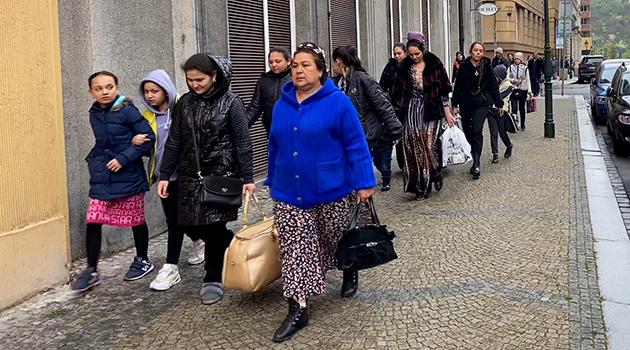Romani refugees from Ukraine pass through Czech Republic on their way to Germany, tell those aiding them that "Putin is killing us!"

More than 30 Romani refugees from Zaporizhzhia, Ukraine, which is under direct attack by Russian occupying forces, arrived in Prague, Czech Republic yesterday morning. A charter bus to evacuate them to Bremen, Germany, had been organized by two young Romani women from Ukraine who fled to Hungary before the outbreak of the war, Anzhelika Bielova and Oleksandra Koriak.
Accommodation and meals for a one-day stopover in Prague were provided to the refugees by the Konexe organization, which also connected the Romani Ukrainian activists with a Romani organization in Germany. “The situation in the Zaporizhzhia region is terrible. Putin is killing us!” one of the Romani women who arrived at the Church of Saint Salvator in Prague, where the Konexe organization provided them with a place to rest, has told the Romea.cz news server.
“We were approached by the Romani Ukrainian activist Oleksandra Koriak with a plan to organize a rescue bus to bring Romani people from the region of southeastern Ukraine, which is an area of heavy fighting, to safety in the European Union. Of course we agreed and did what we could,” Miroslav Brož of the Konexe organization told Romea.cz.
“Through our German friends, we aided them with finding accommodation in Bremen for the Romani refugees. We also offered the refugees a place to relax in Prague during their long journey. Finding accommodation for such a bigger group for one night in Prague was more difficult than we expected and I would like to thank all those who assisted with that,” added Brož.
“Because we are also Romani, we know that Roma still face discrimination. It was clear to us that the Roma would become an even more vulnerable group than other refugees. That is why we decided to organize an evacuation bus,” Koriak told Romea.cz.
“When the war began, we started raising money to provide humanitarian aid to the Roma. We assist people in the southeast of Ukraine, in the Dnipropetrovska and Zaporizhzhia regions,” added Bielova.
Both of these young Romani women, like many other Ukrainians, left the country already on 27 January, in advance of Russia’s terror campaign. They have now returned to Ukraine to aid other Romani people with escaping who have hesitated to do so until now and who have been refusing to leave their homes and families behind.
“Our family has lived in Zaporizhzhia for more than 70 years. We have all had a good time there. We have our houses and we are also in business. We’ve left behind the goods in our shops. We abandoned it all to leave. They may destroy our houses, but who knows. God willing we shall return home,” one of the fleeing Romani women told Romea.cz with hope in her voice.
Konexe has already helped several hundred Romani refugees from Ukraine who make it into the Czech Republic to then leave the country as soon as possible. According to Brož, Romani people in the Czech Republic suffer from discrimination and racism, so it is better for them to travel to Germany, Ireland or Norway.
“We have been advising Romani refugees since the beginning of the war. According to our conscience and our knowledge, and at the same time with pain and shame in our hearts, we tell them the Czech Republic as a country of destination for Romani refugees is unsuitable. We openly admit that this country has a very high level of antigypsyism and that Czech society has never accepted and has refused to include even Romani people with Czech citizenship who have lived here since the [Second World] War. Even for Czech Roma, it is an almost insurmountable problem to find decent housing, at a normal price, outside the ghetto. These people face discrimination or segregation in almost every area of life,” said Brož.
“We are encouraging Romani refugees from Ukraine to seek safe havens in countries where they will not have to face antigypsyism on a daily basis, where they will have better opportunities to educate their children, where they will not face discrimination en masse because of their ethnicity on the housing market and the like. We just think these refugees will be better off in social housing in Bremen than they will be behind the barbed wire of the detention camps at Bělá-Jezová and Vyšní Lhota,” Brož told Romea.cz.
